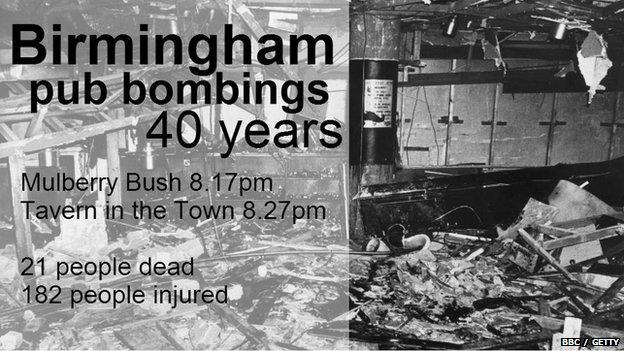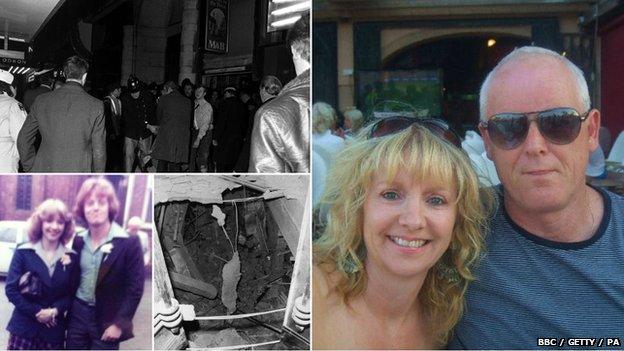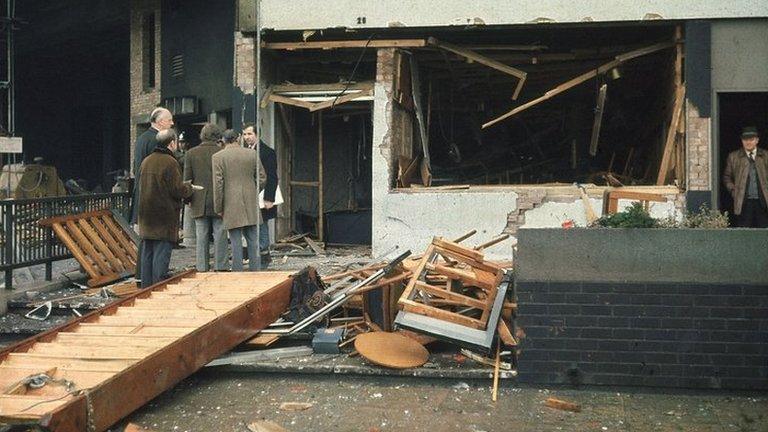IRA Birmingham pub bombings remembered 40 years on
- Published

On the night of 21 November 1974 IRA bombs exploded at two pubs in Birmingham city centre. Twenty-one people were killed and 182 were injured in what at the time was the worst ever terrorist attack on English soil.
Forty years on, some of those caught up in the events recall the terrible night.

Alan Hill: One of the first firemen at the scene

Alan Hill was on red watch at Highgate fire station when they received the call after the first bomb went off at the Mulberry Bush pub. Many Brummies lived in fear following numerous IRA bomb threats and tensions were high. He knew it was likely to be for real this time around.
As the fire engine approached Corporation Street the second bomb went off.
"There were people all over the floor," he said. "No movement. It was in darkness. All the shop fronts had disappeared.
"The explosion had taken the far side of the Rotunda windows. I sent a message saying there had been a large explosion, I gave up counting when I got to about 150 or 160 casualties.
"We asked for 40 ambulances, knowing full well that fire control hadn't got them. All available ones would've been mobilised to the Mulberry Bush.
"I was making a call knowing they were never going to arrive.
"The smell. It was a strong smell of alcohol. Death has its own smell. You had the smell of alcohol and death and you could hear screams.
"As soon as the search light was moved around, you heard screams. They were harrowing. Terrible pain and panic."

Pat Bentley: 'My best friend died without me'

Pat Bentley (pictured top left) was due to go out with her friend Jane Davis on the night of the bombings but after an emotional day during which she broke up with a boyfriend, she decided to give it a miss.
A chance to have a laugh over holiday photos in the Tavern in the Town was instead replaced with a night in front of the TV for the 17-year-old, while her friend went out.
"We were watching TV and the phone rang and it was a lad saying "Oh you're at home." He asked if Jane was with me and then told me some bombs had gone off in town.
"He drove over to my house and picked Jane's dad up, Arthur, on the way. We were wondering whether we should drive into town to find her.
"We couldn't just sit there and do nothing."
Jane was among those killed in the explosion.
Forty years on, Ms Bentley says she still cannot make sense of what happened.
"It makes me feel sad that you could take a life, let alone 21. I could've been in the pub that night but I wasn't. Who can say?
"I do and don't feel guilty. I should've been there with my friend but you just can't say what would've been."

Maureen Mitchell: 'Given the last rites'

Maureen Mitchell, 21, worked as an assistant at an advertising firm in Birmingham city centre. Like many at that age she went out with friends after work. But not too late - the last bus was always at 11pm.
"The Mulberry Bush was a regular haunt. Me and Ian (her boyfriend) went most nights of the week after work with friends.
"I remember telling Ian I was going to a Christmas party at work but our partners weren't allowed to come and I remember telling Ian about how good it was going to be and he couldn't go."
At 20:17 the first bomb went off.
Maureen Mitchell was a young woman when she survived the bombings
"I thought I'd only hurt my leg but the security guy from the Rotunda just picked me up and moved me outside. It wasn't until he put me down, I realised how badly injured my tummy was.
"Days later in hospital, I just remember looking up and my dad crying. Nobody wants to see their dad cry.
"I was given the last rites, it was touch and go for a few days and I was in hospital for about a month.
"My dad never talked about it. He was an Irish Catholic and that is my big regret. I never sat down and talked to him about it and asked him how he felt.
"I don't live all my year round thinking about it but it affects me at this time of year. I don't think it will ever get opened, resolved or found out who did it."

Les Robinson: 'I've found my peace'

Les Robinson popped into The Tavern with his two friends, both called Steve. He bought three pints of lager for 75p - "a bargain price" - and the chat turned silent as the men turned to the pub game - Pong.
"I was 11-4 down. I punched the machine in anger and I walked away. As I walked back to the machine and put my hands on the controls there was a massive bang.
"It doesn't do it justice to say it was just a bang. It filled everything. It filled you. The room. I remember being picked up and doing a half somersault and hitting the wall.
"I opened my eyes. I couldn't see a thing. My hearing went and it didn't come back for days."
He said his first concern was to find his former girlfriend, Ros, with whom he had recently split.
"She had cuts to her, her nose was broken, a piece of wood or glass nearly took off her wrist. Ros didn't get the heat from where she was, so her hair stayed pretty much intact. But, poor soul, she did look a bit of a mess because she'd had her nose broken and black eyes."
One year after the bombing, he proposed to his girlfriend.
"It's no exaggeration to say the Birmingham pub bombings - it's the best thing that ever happened to me.
"You feel guilty when you say how good something has turned out for you, when other people have known nothing else other than pain and grief.
"I found peace on 6 August 1976 when I married Ros. That is when I got my closure."

Nick Owen, Midlands Today reporter and BBC Radio Birmingham reporter at the time

"A week before a bomb had gone off in Coventry. James McDade had blown himself up. That Thursday night (the night of the Birmingham pub bombings) the body was going to be flown back from Coventry to Belfast. It was my job to report on his body being flown from Birmingham Airport as his body was brought to the terminal.
"There were hundreds of police lining the route. I did live reports. I then heard around about 7-ish that baggage handlers in Belfast, who were assumingly anti-IRA and Protestants, were refusing to handle his body. So the body was stuck in Birmingham.
"I spoke to our news editor and I was told to come back to the office.
"I immediately came back. By this time it was very clear that it was such a serious incident. It was very sketchy. There was nothing such as news channels and rolling news.
"It was very clear how serious it was. I was told to go home as I would be reporting at 3am. So I grabbed some sleep and came back at 3am.
"I was by the Mulberry Bush doing live reports every 15 minutes or half hour for the rest of the day.
"It was a shell and an absolute ruin. They were looking for bodies and pieces of bodies. It was a grizzly scene. There was no road blocked. People were slowly driving past, looking at the scene in front of them.
"It's an incident I'll never forget for the rest of my life."
You can hear an account of what happened 40-years ago on BBC WM from 20:00 on Friday 21 November.
- Published21 November 2014
